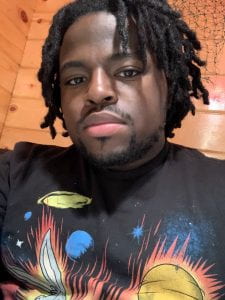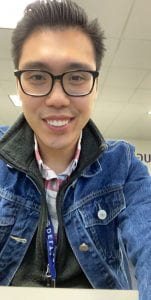Hello class! My name is Hanah Feinstein, and I had the pleasure of interviewing Sabria Hall. Before I dive deep into my conversation with Sabria, I need to apologize to you, the reader. I need to apologize that you are only reading about Sabria Hall second hand as opposed to getting the privileged to speak with her directly. Sabria Hall is a one-of-a-kind, creative, and empathetic person who inspires anyone who meets her. So, I am sorry that while I won the lottery in getting the opportunity to talk with her, you are only reading about the glimmer of light that she is. But this is the position we find ourselves, so please join me as we learn about our inspiring classmate, Sabria Hall.
Today, Sabria Hall is a student at Georgia State University majoring in film and media studies. But to see how she got here, we need to rewind back to 2011. In 2011, Sabria dropped out of high school, and she never expected to return to formal education. Instead, books were her education. Through reading, she was taught creativity, world building, and how limitless her potential is. Books empowered Sabria to develop her own individual academic self outside of the classroom. Instead of just memorizing facts, she views academics creatively, and through critical thinking. While she was educating herself through books, she was also gaining life skills as an employee at Chik-Fil-A. The company was impressed by Sabria’s leadership initiatives and compassion for her coworkers, so she was quickly promoted to a managerial position. As a manger, Sabria gained confidence in her capacity to achieve anything she put her mind to. This confidence encouraged Sabria to go back to school despite her friends doubting her. In 2019, she proved her cynics wrong by getting her GED, and soon after she applied to Georgia State University. This decade has awarded Sabria with life lessons that she translates into her academic self.
Sabria Hall is a named to remember. One day we are going to see her name in lights as she wins Oscars for filmmaking. Sabria is studying film with a focus in directing, screenwriting, and editing. She loves all genres of films, and she observes aspects of movies that the typical viewer would never notice. She applies his type of critical analysis to her school academics as well. Her earliest influence was Spike Lee. Sabria immediately fell in love with his films, but she felt discouraged to enter the film industry because of the lack of representation of Black female filmmakers. Her perception changed when she discovered filmmaker Ava DuVernay. Seeing Ava DuVernay’s success as a filmmaker inspired Sabria to pursue her dreams. Sabria’s determination and intelligence will be the momentum to making her dreams a reality.
Sabria is an excellent writer. Her creativity shines in her ability to convey language in the written form. She is a prose pro. However, she admits that her biggest weakness is not being receptive to criticism. She does not like getting feedback on her writing, and this inhibits her stories from being as great as they could be. Even great writers need to revise their work and receive constructive criticism. “The interactive, social nature of writing makes peer review not only an effective source of feedback, but also an essential skill” (Friend 276). Bad Ideas About Writing teaches us the benefits of receiving feedback and constructive criticism to improve our writing. Sabria’s goal for this class is to become more comfortable with receiving feedback.
As our conversation progressed, we started talking about our favorite TV shows. We shared our love for Parks and Rec, and Sabria says she identifies with Leslie Knope. Leslie Knope is a compassionate leader who is motivated by her ambitions and devoted to caring for the people around her. Sabria Hall really is a real-life Leslie Knope. Like Ava DuVernay inspired her, Sabria Hall is going to inspire so many young girls to follow their dreams.
Friend, Christopher. “Student Writing Must Be Graded By The Teacher.” Bad Ideas About Writing.” Edited by Cheryl E. Ball and Drew M. Loewe, The Digital Publishing Institute, 2017, 273-276.




